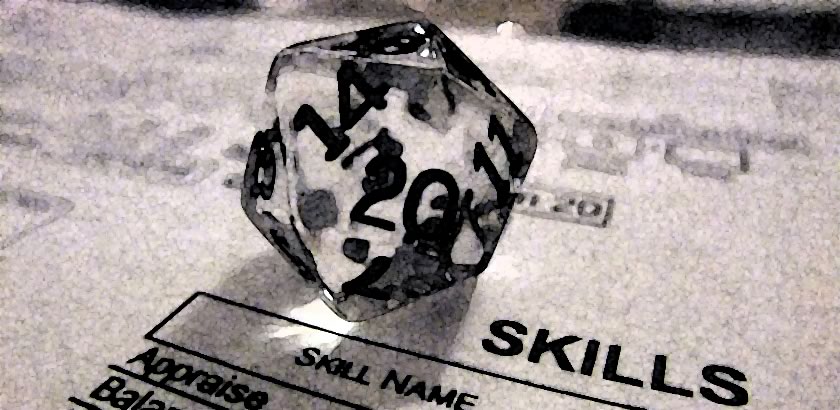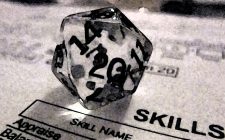In Skill Challenge Encounters, Part 1, I introduced the challenge encounter framework that I use in my games. It works in practice, but the downside is that players really only have a couple mechanical choices. So if they enjoy tactical planning, using the basic framework can get stale after a while.
However!
You only need very minor changes to the format get you different tactical situations. So here are some variations I’ve used. Oh, and a word of advice. If you decide to use challenge encounter variants in your own games, explain the variant rules before the encounter starts, when you describe the target thresholds, allowed skills, and the success/failure conditions.
Alternate Rules
The easiest changes you can make are to slightly change existing rules. If you want, you can decide to make these the default house rules, or you can use an alternate rule on an encounter occasionally just to shake things up.
Vary the Allowed Skills Rule
Unrestricted skills. Rather than restrict the allowed skills to a specific list, allow players to use any skill they can justify in-character. This gives the players more agency and makes the skill challenge feel less artificially constrained. The trade off is that you won’t be forcing players to use less optimized skills and thus make tough choices about how high a check to target they’ll attempt. They’ll mostly just use their best skills and not worry about giving a bonus to the next player, because they’ll know the other players will also use their best skills. To ameliorate this tendency, you can make the skill challenge harder by lowering the maximum number of Setbacks allowed or be firmer about how well they justify/explain their skill choices.
Off-list Skills. Allow players to use a skill off the “allowed skills” list for a harder check threshold. So, for example, if they want to use Perception, but it’s not on the allowed skills list, let them do so. But! If they would have gone for a Medium check, they have to use the Hard check threshold to get the Medium check reward.
No repeats. Players can’t repeat the skills they use from the previous rounds. Doing this forces players to use a wider variety of skills. One guaranteed drawback is that you’ll hear a lot of groans of pain when you announce out the allowed skills. If you use this variant, try to make your list of allowed skills on the longer side. Also, you’ll need to trust your players, that they won’t cheat and repeat skills if you don’t keep track of what they use.
No repeats in the group. If you want to really have discussions of cooperative tactics and strategy, forbid players from repeating skills altogether. So, if player A uses Perception, no one else can use it for the rest of the Challenge. To make tracking this easier, have a skill list of all skills that you cross off as you’re going through the encounter. This restriction is more practical when you’re using dual-skill skill checks or with long or unrestricted lists of skills, so if you’re using single-skill checks, perhaps simply limit the number of times a skill can be used. For example, Perception can only be used twice in the challenge.
Vary the Turn Order Rules
Normally, the turn order is entirely random, but by using different turn order rules, you can let turn strategy play a part.
Continuous turn order. You could carry over the turn order from a previous challenge or combat (as if it were a continuation).
Modifier. Like having an initiative bonus, you could allow a modifier from a skill such as Dungeoneering or Insight or Streetwise. If you choose to do so, you can vary the skill you use depending on the challenge type (for example, maybe social challenges use Streetwise as their turn order modifier).
Popcorn Initiative. In this system, the first person who wants to go, goes. Then they choose the next person to go, and the second person chooses the third, and so on until everyone has gone in the round, and then you start the new round.
Delays. You could allow any player to delay their turn, either once per player per challenge, or once per round. Delaying adds another aspect for players to strategize beforehand.
Vary the Turns Themselves
More fundamental than varying the turn order, you can vary what the players are able to do in a specific turn.
Rituals. If the challenge compresses time, taking place over the course of hours or days, allow players to use a ritual instead or in addition to making a check on their turn.
Varied modifiers. Impose a penalty or bonus for using specific skills. For example, if there’s a language barrier, perhaps all social checks incur a penalty that other checks don’t. On the other hand, if the characters are the toast of the town, maybe all social checks have a bonus. If the challenge is taking place while the characters swim on the ocean, perhaps physical checks have a higher threshold.
Alternatives to rewards. Rather than giving bonuses as a reward for succeeding in Low and High checks, you can offer something else tempting (such as a bit of info or a good encounter). This can be an interesting choice for players. Do they want to give the next player a bonus, or would they rather learn a secret? Or it could provide you with a way to insert pieces of the story that the players skipped over or missed before.
For example, a Setback could result in a combat encounter or losing influence over someone, while a Breakthrough could result in impressing an ally or a role playing encounter where they find a useful resource. I recommend allowing the player that gained the Breakthrough or Setback to choose which they prefer–the modifier or the mystery result–and to allow at least some of the results to be roleplaying or combat encounters. Just don’t lose track of the challenge trackers when you’re interrupting it to do the mystery encounter.
Bold Recovery. Once per challenge, you can allow one player to help another player redeem a Setback. So, it works basically like a power that triggers when a player gets a setback. Any other player can immediately try for a Hard check of the same type. If they succeed, that triggering Setback is replaced with a Breakthrough.
Alternate Formats
In addition to making changes to individual rules, you can also incorporate variations on the overall framework. There are four main ones variant formats that I’ve found useful.
Timed Format
In a timed variant, the challenge ends after a total number of turns or rounds, rather than after a particular number of Setbacks. Narratively, it represents succeeding while the clock ticks down. It works well for situations where something has to be done by a particular time, like…
- Saving someone from dying when they only have 6 hours to find or make the antidote before the poison kills them.
- Finding the groom before the wedding is scheduled to start.
- Making a sacred object in time for the annual ceremony.
Strategically, it changes the risk/benefit analysis. The choices are weighted toward higher-risk challenges, with Low checks being almost worthless.
You can track the rounds with marks on a paper or announcing it to the players, but also consider using something tangible, such as removing tokens from a pile. When the pile is empty, the party’s time has run out.
Chase Format
The chase variant is a slight change on the timed variant, where the counter ticks down, but each Turn means the number of Breakthroughs required increases. Narratively, it represents doing something while the goal gets further and further out of reach, until it’s impossible. This works well for situations like…
- Chasing someone. Each turn, they get a little farther away. If the party doesn’t find their quarry fast enough, they’ll lose the trail.
- Fixing a boat that’s sinking. Each turn, the boat gets more underwater. If the party doesn’t fix it fast enough, it will sink.
- Halting the spread of an epidemic. Each turn, more people are infected. If the party doesn’t find all the infected in time, the epidemic will spread beyond your area.
Strategically, this puts even more pressure to gamble on higher rank checks, because if they gain one Breakthrough each round, the party will not make progress toward the goal.
Although you can track this orally, consider making a tangible tracker where the players can watch their progress toward the goal marker and the goal marker’s progress toward the end. For example, this shows a set up where the party (P) needs to catch the goal (G) before the goal reaches the end. Each Breakthrough moves P one space to the right. At the end of each turn, G moves one space to the right. If you do this, consider changing the checks so that succeeding on a Hard gives you two Breakthroughs and succeeding on an Exceptional gives you three.
| P | G |
Stages Format
In the stages variant, each Breakthrough results in its own mini reward. Even if they fail the overall challenge, they still get something. Narratively it represents a gradual progress toward the goal. It works well for situations like…
- Extracting information: each Breakthrough grants the player another bit of info from the person or people being interrogated. If your players win the challenge, they also get another reward, such as a one-time bonus to a Lore check related to the subject.
- Collecting items: each Breakthrough allows them to find another item. If the players win the challenge, they can also each gain a one-time bonus to using the items.
- Travel: each Breakthrough moves them forward to a new location. If the players win the challenge, they also gain some information or a friend along the way.
- Training a beast: each Breakthrough allows them to teach the beast another command. If the players win the challenge, the beast gains a one-time bonus to a combat element.
Strategically, this can lower the pressure on succeeding. To keep it interesting, you can make the overall challenge a bit harder, or you can let the players know that there’s an additional reward for winning the challenge.
Compound Stages Format
The compound stages variant is a more complex form of the stages variant. In this scenario, the skill challenge is an abstraction of something that the players work towards over time. Each turn represents a set amount of time, for example, an hour, a day, or several days. For example, it could be used for…
- Wilderness journey: To give the players a feeling of the epic difficulty and length of the journey, start each turn with a weather/wildlife report e.g. “Dawn breaks clear and bright in the bitter cold air. You see a few small birds among the scraggly shrubs and dried grasses.” And then each turn, the player describes one thing the did to help the party move forward.
- Palace intrigue. The beginning of each turn could mention gossip or the day’s planned events. The gossip may be affected by the things they do, but should largely move forward in their absence, plots and intrigues taking place around them that they can try to interact with or learn about. E.g. “The courtiers are abuzz with the news that the Minister of the Winds is hosting a ball game this afternoon. The Ocelot Minister has said he’s entering the game.” Each turn, the player could describe one thing they did to help the party gain favor in court, either in general or in reaction to the day’s gossip.
- Investigating a mystery. The beginning of each turn could mention another clue found or impact from the mystery. For example, “A runner brings news that another shrine has been vandalized. The locals swear they kept watch all night, but there was no sign of intruders until dawn brought enough light to see the damage.” Each turn, the player can describe one thing they did to help the party solve the mystery.
- Treating an epidemic. To give the players a sense of the grinding work and desperate stakes, start each turn with a something like physician’s notes, e.g. “Another three villagers are brought in raving and fevered overnight. This makes 14 in your makeshift infirmary. It should be 15, but one baby died last night. His big sister comforts his mother in your office.” And each turn, the players describe one thing they did to help the party treat the patients or develop a treatment.
There is no winning or losing the challenge. The stages last as long as it takes the players to gain all the needed Breakthroughs to achieve their goal. I’d recommend setting that number at twice the number of players, and then preparing beginning-of-turn descriptions for 2.5 – 3 times as many turns as players, to account for turns where players attempted Low checks or got Setbacks. Also prepare at least half as many good results and half as many bad results as players. (You can always reuse them later in your campaign if you don’t use them now).
Since the skill challenge itself cannot be lost, you need to impose some other stakes into the challenge. The easiest way to do this is to have something else going on in the background. Perhaps a key event is looming, or they know the villain is on the way, or every day another villager is killed. They can take as long as they want to succeed, but they know there’s a price that they’ll pay for every delay. Another thing to do is to make the mystery result so enticing that they want to gamble for a chance at it.





[…] really shake things up and make different challenges play out differently from each other. Next up: Skill Challenges, Part 2, in which I cover variants. Plus, if you have questions, let me know and I’ll cover that. […]